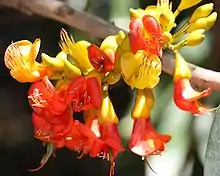ADA clade
The ADA clade is the earliest-branching monophyletic clade of the flowering plant subfamily Faboideae (or Papilionaceae). Evidence for this clade was sparse[3] until recent molecular phylogenies that included basal faboid genera that previously had been poorly sampled.[1][4]
| ADA clade | |
|---|---|
 | |
| Castanospermum australe | |
| Scientific classification | |
| Kingdom: | Plantae |
| Clade: | Tracheophytes |
| Clade: | Angiosperms |
| Clade: | Eudicots |
| Clade: | Rosids |
| Order: | Fabales |
| Family: | Fabaceae |
| Subfamily: | Faboideae |
| Clade: | ADA clade Cardoso et al. 2012[1][2] |
| Tribes | |
| |
| Synonyms | |
| |
Description
This clade is composed of a morphologically eclectic collection of genera.[4] It is one of only three clades (the other two being Swartzieae and the Cladrastis clade) in Faboideae that lack the 50-Kb plastid DNA inversion that is characteristic of the Meso-Papilionoideae.[4] The name of this clade is informal and is not assumed to have any particular taxonomic rank like the names authorized by the ICBN or the ICPN.[2] The clade does not currently have a node-based definition and no morphological synapomorphies have been identified.
References
- Cardoso D, de Queiroz LP, Pennington RT, de Lima HC, Fonty É, Wojciechowski MF, Lavin M (2012). "Revisiting the phylogeny of papilionoid legumes: new insights from comprehensively sampled early-branching lineages". Am J Bot. 99 (12): 1991–2013. doi:10.3732/ajb.1200380. PMID 23221500.
- Wojciechowski MF. (2013). "Towards a new classification of Leguminosae: Naming clades using non-Linnaean phylogenetic nomenclature". S Afr J Bot. 89: 85–93. doi:10.1016/j.sajb.2013.06.017.
- Ireland HE, Pennington RT, Preston J (2000). "Molecular systematics of the Swartzieae". In Herendeen PS, Bruneau A (eds.). Advances in Legume Systematics, Part 9. Kew, UK: Royal Botanic Gardens. pp. 277–298. ISBN 184246017X.
- Cardoso D, Pennington RT, de Queiroz LP, Boatwright JS, Van Wyk B-E, Wojciechowski MF, Lavin M (2013). "Reconstructing the deep-branching relationships of the papilionoid legumes". S Afr J Bot. 89: 58–75. doi:10.1016/j.sajb.2013.05.001.